Guangdong raises emergency response for heavy rain-triggered flood to Level II
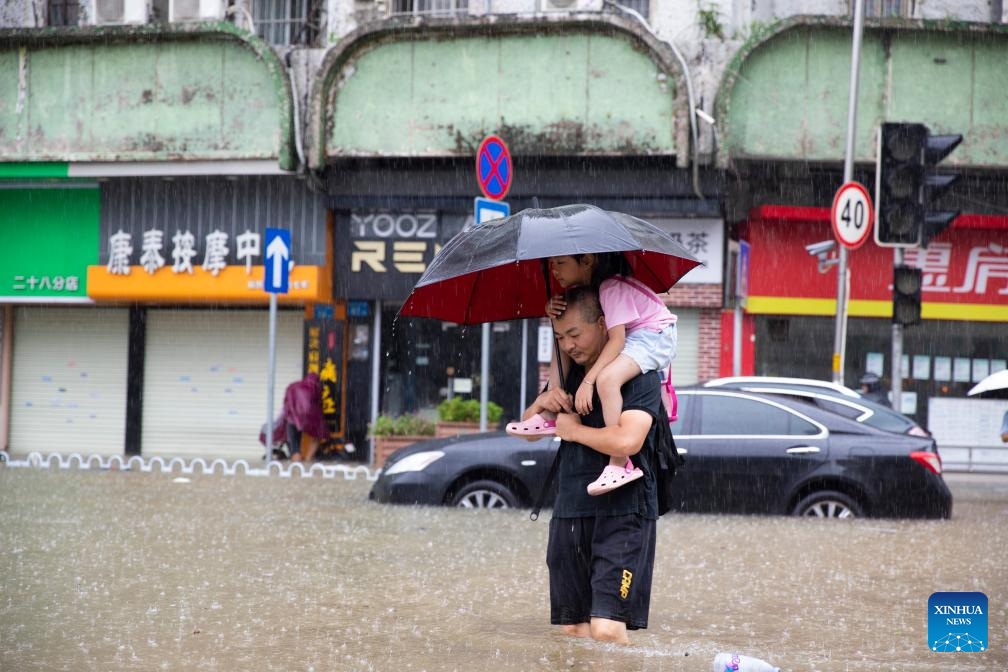
A man carrying his child wades through floodwater on a flooded road in Panyu District of Guangzhou, south China's Guangdong Province, Sept. 8, 2023.
Affected by the residual cloud system outside Typhoon Haikui, the 11th typhoon of this year, and monsoon, many cities and counties in the Pearl River Delta region has experienced torrential rains since Thursday, with extremely heavy rainstorm lashing some areas.
According to the monitoring of the meteorological observatory of Guangzhou, capital city of Guangdong, from 8:00 a.m. Thursday to 3:00 a.m. Friday, the city witnessed this year's strongest rainstorm, reaching a particularly serious level.
The flood, drought and typhoon control headquarters of south China's Guangdong Province updated the emergency response for heavy rain-triggered flooding from Level IV to Level II, the second-highest level, at 1:30 a.m. Friday. (Xinhua/Li Jiale)
GUANGZHOU, Sept. 8 (Xinhua) -- The flood, drought and typhoon control headquarters of south China's Guangdong Province updated the emergency response for heavy rain-triggered flooding from Level IV to Level II, the second-highest level, at 1:30 a.m. Friday.
Affected by the residual cloud system outside Typhoon Haikui, the 11th typhoon of this year, and monsoon, many cities and counties in the Pearl River Delta region has experienced torrential rains since Thursday, with extremely heavy rainstorm lashing some areas.
The rainfall will continue to affect Guangdong, with high risks of floods in small and medium-sized rivers, mountain torrents, geological disasters and urban and rural waterlogging, the authorities said.
Many places in the province have issued red alerts for rainstorms.
From 5 p.m. Thursday to 6 a.m. Friday, the average rainfall in Shenzhen, a coastal city in Guangdong, was 202.8 mm, and the maximum cumulative rainfall reached 469 mm, according to the municipal meteorological bureau.
The bureau said this rainfall featured super strong intensity, long duration and wide range of torrential rain, with four rainfall records, namely two-hour, three-hour, six-hour and 12-hour maximum rainfall, broken since Shenzhen started keeping meteorological records in 1952.
Shenzhen's flood, drought and typhoon control headquarters issued a notice Friday morning that primary and secondary schools and kindergartens across the city will suspend classes on Friday in consideration of ensuring the citizen's safety and property.
Service will be suspended in parts of six subway lines. Enterprises and public institutions in hard-hit Luohu District and residents living in the district will also suspend work on Friday.
The authorities alerted people to stay away from dangerous areas such as mountains, rivers, slopes, and retaining walls.
According to the monitoring of the meteorological observatory of Guangzhou, capital city of Guangdong, from 8:00 a.m. Thursday to 3:00 a.m. Friday, the city witnessed this year's strongest rainstorm, reaching a particularly serious level.
The heavy rainfall caused severe waterlogging in many parts of Guangzhou. The Shiqiao Station of Metro Line 3 in Panyu District was temporarily closed due to deep water outside the station.
Several districts in Guangzhou have also suspended classes in accordance with the rainstorm warning.
As of 5 a.m. Friday, a total of 2,516 people had been evacuated from dangerous areas in Guangzhou, according to the municipal flood, drought and typhoon control headquarters.
A total of 43 train services have been suspended after heavy rainstorm lashed the Pearl River Delta region, according to the China Railway Guangzhou Group Co., Ltd.
The Guangzhou-Shenzhen-Hong Kong high-speed railway line has not been affected yet, the company said.
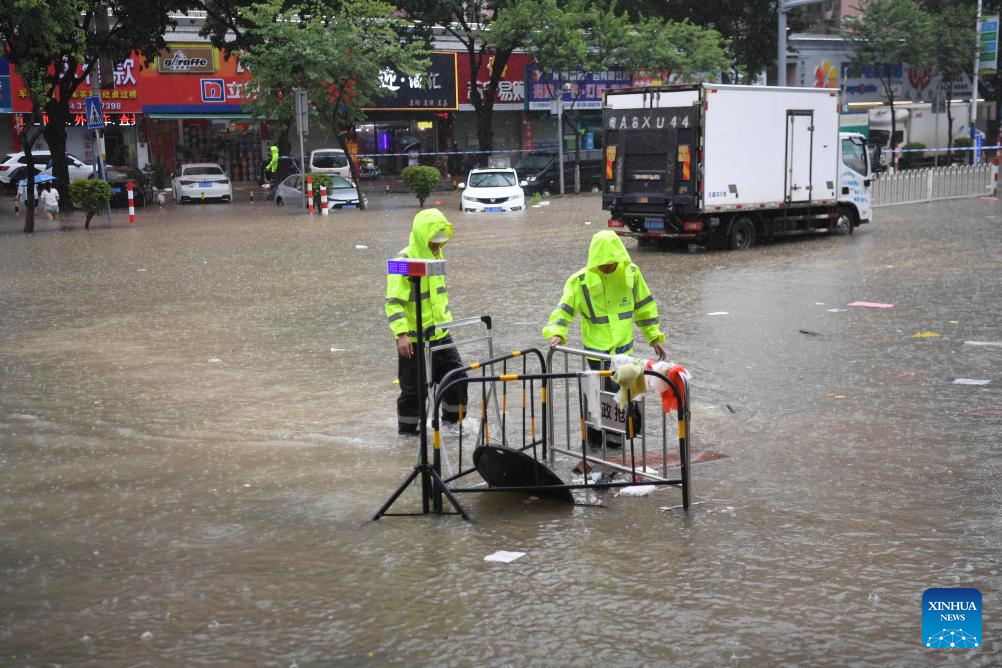
Staff members fence off a manhole on a flooded road in Panyu District of Guangzhou, south China's Guangdong Province, Sept. 8, 2023.
Affected by the residual cloud system outside Typhoon Haikui, the 11th typhoon of this year, and monsoon, many cities and counties in the Pearl River Delta region has experienced torrential rains since Thursday, with extremely heavy rainstorm lashing some areas.
According to the monitoring of the meteorological observatory of Guangzhou, capital city of Guangdong, from 8:00 a.m. Thursday to 3:00 a.m. Friday, the city witnessed this year's strongest rainstorm, reaching a particularly serious level.
The flood, drought and typhoon control headquarters of south China's Guangdong Province updated the emergency response for heavy rain-triggered flooding from Level IV to Level II, the second-highest level, at 1:30 a.m. Friday. (Xinhua/Deng Hua)

This photo shows a cordoned-off crossroad in Panyu District of Guangzhou, south China's Guangdong Province, Sept. 8, 2023.
Affected by the residual cloud system outside Typhoon Haikui, the 11th typhoon of this year, and monsoon, many cities and counties in the Pearl River Delta region has experienced torrential rains since Thursday, with extremely heavy rainstorm lashing some areas.
According to the monitoring of the meteorological observatory of Guangzhou, capital city of Guangdong, from 8:00 a.m. Thursday to 3:00 a.m. Friday, the city witnessed this year's strongest rainstorm, reaching a particularly serious level.
The flood, drought and typhoon control headquarters of south China's Guangdong Province updated the emergency response for heavy rain-triggered flooding from Level IV to Level II, the second-highest level, at 1:30 a.m. Friday. (Xinhua/Deng Hua)
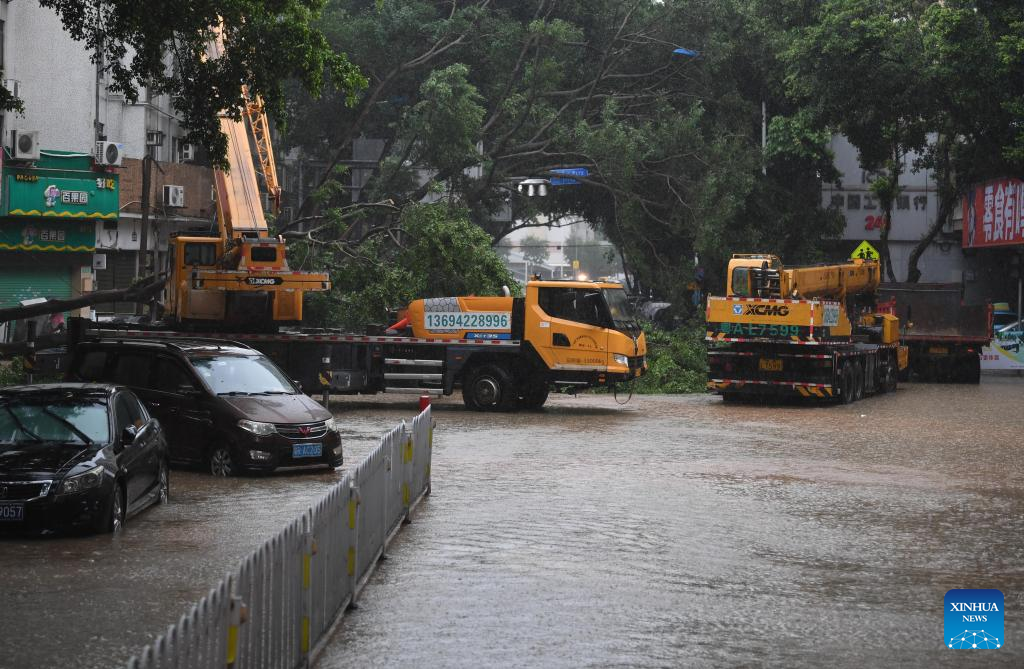
Workers remove fallen trees in Panyu District of Guangzhou, south China's Guangdong Province, Sept. 8, 2023.
Affected by the residual cloud system outside Typhoon Haikui, the 11th typhoon of this year, and monsoon, many cities and counties in the Pearl River Delta region has experienced torrential rains since Thursday, with extremely heavy rainstorm lashing some areas.
According to the monitoring of the meteorological observatory of Guangzhou, capital city of Guangdong, from 8:00 a.m. Thursday to 3:00 a.m. Friday, the city witnessed this year's strongest rainstorm, reaching a particularly serious level.
The flood, drought and typhoon control headquarters of south China's Guangdong Province updated the emergency response for heavy rain-triggered flooding from Level IV to Level II, the second-highest level, at 1:30 a.m. Friday. (Xinhua/Deng Hua)
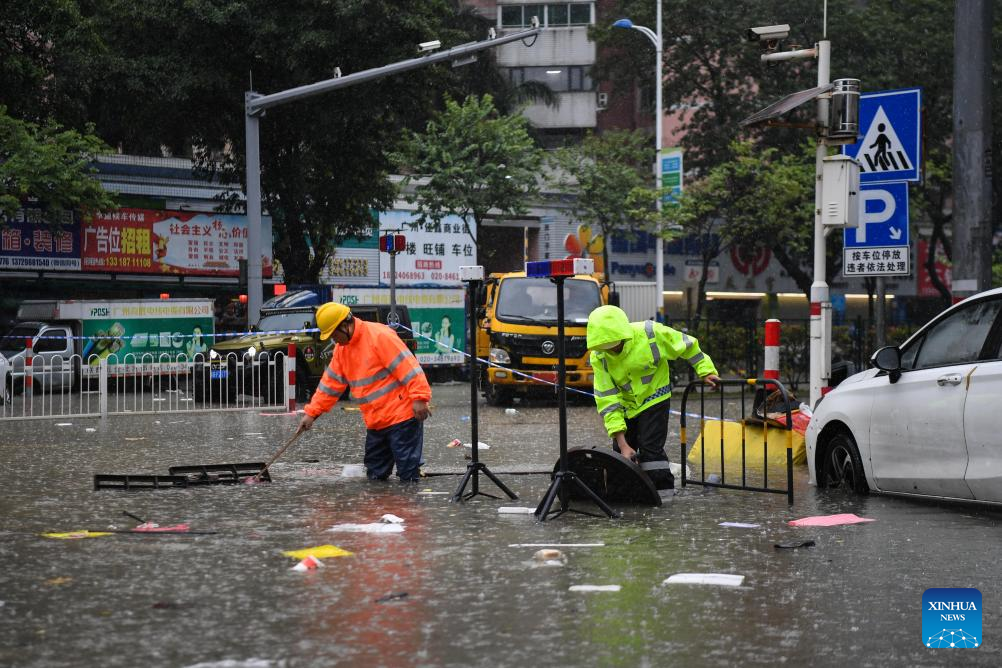
Staff members clean up sewerage facilities in Panyu District of Guangzhou, south China's Guangdong Province, Sept. 8, 2023.
Affected by the residual cloud system outside Typhoon Haikui, the 11th typhoon of this year, and monsoon, many cities and counties in the Pearl River Delta region has experienced torrential rains since Thursday, with extremely heavy rainstorm lashing some areas.
According to the monitoring of the meteorological observatory of Guangzhou, capital city of Guangdong, from 8:00 a.m. Thursday to 3:00 a.m. Friday, the city witnessed this year's strongest rainstorm, reaching a particularly serious level.
The flood, drought and typhoon control headquarters of south China's Guangdong Province updated the emergency response for heavy rain-triggered flooding from Level IV to Level II, the second-highest level, at 1:30 a.m. Friday. (Xinhua/Deng Hua)
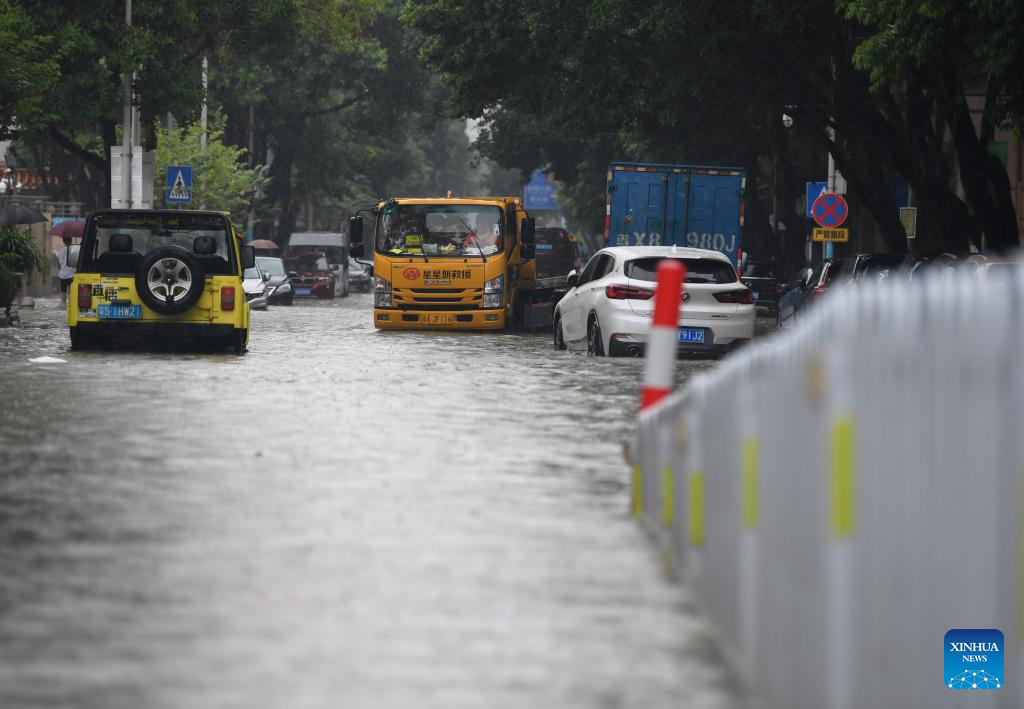
A rescue vehicle runs on a flooded road in Panyu District of Guangzhou, south China's Guangdong Province, Sept. 8, 2023.
Affected by the residual cloud system outside Typhoon Haikui, the 11th typhoon of this year, and monsoon, many cities and counties in the Pearl River Delta region has experienced torrential rains since Thursday, with extremely heavy rainstorm lashing some areas.
According to the monitoring of the meteorological observatory of Guangzhou, capital city of Guangdong, from 8:00 a.m. Thursday to 3:00 a.m. Friday, the city witnessed this year's strongest rainstorm, reaching a particularly serious level.
The flood, drought and typhoon control headquarters of south China's Guangdong Province updated the emergency response for heavy rain-triggered flooding from Level IV to Level II, the second-highest level, at 1:30 a.m. Friday. (Xinhua/Deng Hua)
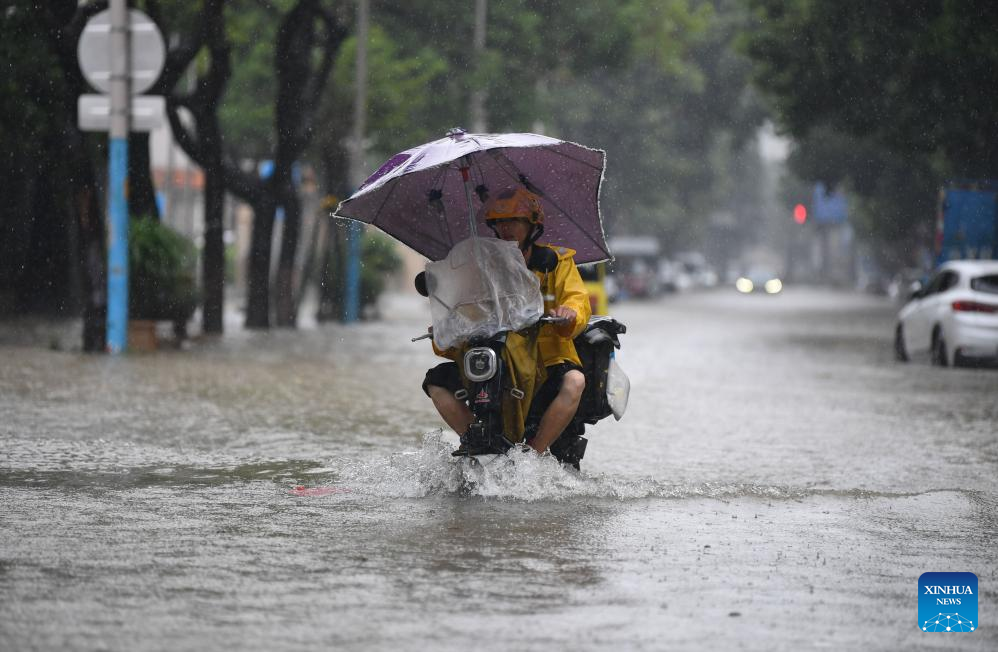
A deliveryman rides on a flooded road in Panyu District of Guangzhou, south China's Guangdong Province, Sept. 8, 2023.
Affected by the residual cloud system outside Typhoon Haikui, the 11th typhoon of this year, and monsoon, many cities and counties in the Pearl River Delta region has experienced torrential rains since Thursday, with extremely heavy rainstorm lashing some areas.
According to the monitoring of the meteorological observatory of Guangzhou, capital city of Guangdong, from 8:00 a.m. Thursday to 3:00 a.m. Friday, the city witnessed this year's strongest rainstorm, reaching a particularly serious level.
The flood, drought and typhoon control headquarters of south China's Guangdong Province updated the emergency response for heavy rain-triggered flooding from Level IV to Level II, the second-highest level, at 1:30 a.m. Friday. (Xinhua/Deng Hua)
Photos
Related Stories
- Zhuozhou completes repairs on cultural relics damaged by floods
- Guangdong Province issues green offshore municipal gov't bond in Macao SAR
- China activates level-IV emergency response to flooding in southern areas
- Taitou Town in Tianjin holds 1st large-scale rural fair after flood
- Stronger supervision of funding required in post-flood recovery
Copyright © 2023 People's Daily Online. All Rights Reserved.









